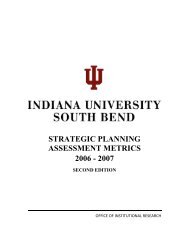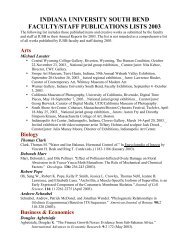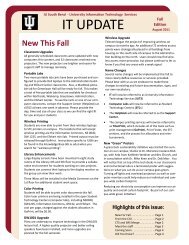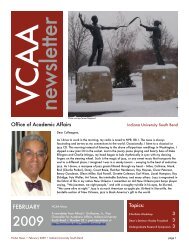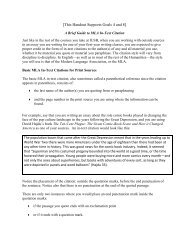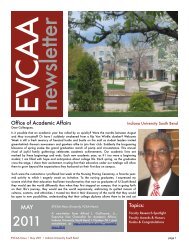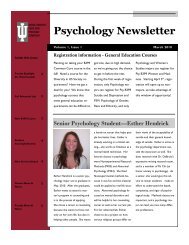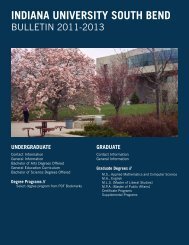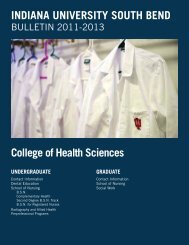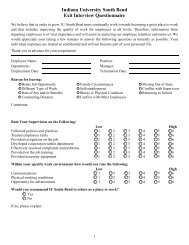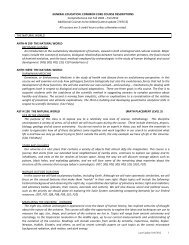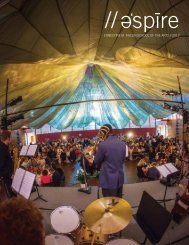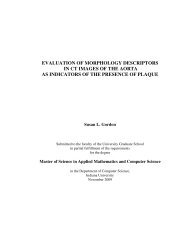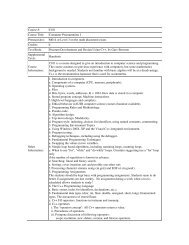Current version - Indiana University South Bend
Current version - Indiana University South Bend
Current version - Indiana University South Bend
Create successful ePaper yourself
Turn your PDF publications into a flip-book with our unique Google optimized e-Paper software.
1883 COLLEGE OF LIBERAL ARTS AND SCIENCES<br />
Certificate in International Studies<br />
The Certificate in International Studies allows students<br />
from all disciplines to add international breadth to their<br />
program. In an increasingly interdependent world, it is<br />
vital to develop expertise in this area. Evidence of focused<br />
international study is looked upon as a key distinction by<br />
employers in business, government, education, the arts,<br />
human services, and other areas, as well as by graduate<br />
and professional schools.<br />
The certificate consists of a minimum of 15 credit hours<br />
of courses designated as having an international focus,<br />
and two semesters of a world language. Although not<br />
required, a study abroad experience is recommended.<br />
All study abroad counts toward the certificate, and if<br />
it involves another language, it also counts toward the<br />
language requirement.<br />
The 21 hours must be distributed as follows:<br />
• 6 credit hours in a world language<br />
• 15 credit hours must include no more than one<br />
100-level and at least one 400-level course (world<br />
language courses do not count toward the remaining<br />
15 credit hours)<br />
The 21 credit hours must include courses from three<br />
academic units in a program that focuses either on a<br />
topic or a geographic area. The courses can also satisfy<br />
other liberal arts and sciences requirements.<br />
If you wish to earn a Certificate of International Studies,<br />
contact the director of international programs.<br />
International Studies Minor<br />
International studies is the cross-national<br />
interdisciplinary study of contemporary global issues<br />
and world regions. It combines the social sciences,<br />
humanities, and professional fields to create an<br />
interdisciplinary approach to understanding our<br />
increasingly interconnected world.<br />
The minor consists of a minimum of 15 credit hours in<br />
at least three different disciplines including a mandatory<br />
capstone course, and at leastLevel 2 competency in a<br />
world language. The 15 credit hours must be distributed<br />
as follows:<br />
INTL-I 490 International Studies Capstone<br />
Seminar<br />
100- or 200-level core courses with broad international<br />
content (3-6 cr.)<br />
300-400 level core courses with broad international<br />
content (6-9 cr.)<br />
For a listing of core courses, see the International Studies<br />
minor brochure. If you wish to earn an International<br />
Studies minor, contact the director of international<br />
programs.<br />
Latin American/Latino Studies<br />
(574) 520-4266<br />
www.iusb.edu/~sbintl<br />
Coordinator: Froysland<br />
The Latin American/Latino Studies Program focuses<br />
on the culture, society, and history of <strong>South</strong> America,<br />
Central America and Mexico, and the Caribbean, as well<br />
as the experiences in the United States of people and<br />
their descendents from these regions. The approach<br />
is holistic and interdisciplinary, combining language<br />
proficiency and cultural appreciation with analysis of<br />
social institutions and the processes of social, political,<br />
economic, and cultural change.<br />
For more information about the Latin American/Latino<br />
Studies Program, contact any of the following faculty<br />
members: Barrau, L. Chen, Fong-Morgan, Froysland,<br />
Griffin, S.R. Sernau, or VanderVeen.<br />
Minor in Latin American/Latino<br />
Studies (15-18 cr.)<br />
(All courses are 3 credit hours, unless otherwise designated.)<br />
Core Courses<br />
Select two courses in Latin American history, politics,<br />
society, or culture:<br />
ANTH-E 300 Culture Areas and Ethnic Groups<br />
VT:<br />
ANTH-E 335<br />
Peoples and Cultures of Latin America<br />
Ancient Civilizations of<br />
Mesoamerica<br />
HIST-A 352 History of Latinos in the United States<br />
HIST-H 211 Latin American Culture and<br />
Civilization 1<br />
HIST-H 212 Latin American Culture and<br />
Civilization 2<br />
POLS-Y 330 Central American Politics<br />
POLS-Y 337 Latin American Politics<br />
SOC-S 362 World Societies and Cultures<br />
(Mexico or Costa Rica)<br />
SPAN-S 275 Hispanic Culture and Conversation<br />
SPAN-S 302 The Hispanic World 2<br />
SPAN-S 363 Introducción a la Cultura Hispánica<br />
SPAN-S 412 Spanish America: The Cultural<br />
Context<br />
Electives (6 cr.)<br />
The 6 credit hours of electives may be drawn from the<br />
following courses or an approved substitute. Students<br />
seeking to apply a course with a comprehensive international<br />
theme to the minor should be able to show that a major<br />
portion of their work, such as a term paper or similar<br />
assignment, dealt directly with a Latin American/Latino<br />
topic. To preserve the minor’s interdisciplinary focus,<br />
courses must be drawn from at least two departments.<br />
Students must take one 400-level course with a Latin<br />
American or Latino Studies focus.<br />
VT: = Variable title



